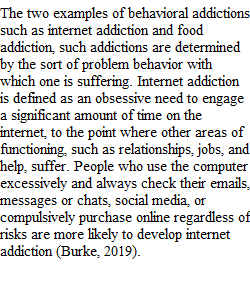


Q There are a variety of activities, behaviors, or even hobbies upon which some individuals can become psychologically dependent/addicted. Some of these activities may not be as life threatening as substance/drug addictions, but they can have profound negative effects on the individual and society. We don't really know the reason why some people compulsively engage in a behavior, while others can engage in the same activity without becoming psychologically dependent upon it. In general, any behavior that is compulsively done by a person to the extent that it causes physical, social, or psychological problems to the individual, his/her family, or society would be considered to be an addictive behavior for that individual. Choose 2 examples of behavioral addictions. Describe them, and see if you can find any stats on who is most affected. What are some signs of behavioral "addiction" as opposed to just heavy use? What are some potential treatments for behavioral addiction? Citations are expected. In your responses, you may want to explore why you think these things are becoming more prevalent than they were several decades ago. Do you have any personal experience (or know someone) with these conditions? How do they affect one's life? Does/should society treat these conditions as seriously as we do substance addictions?
View Related Questions